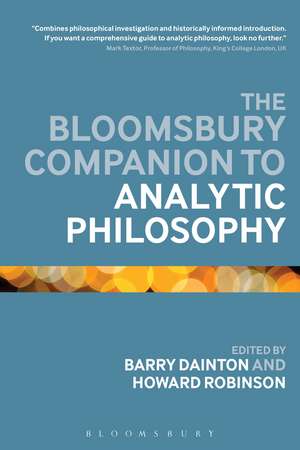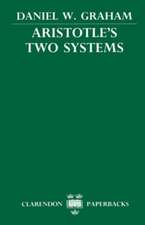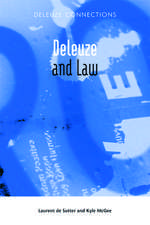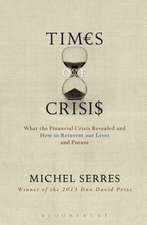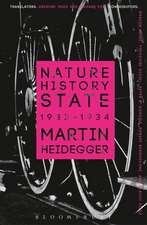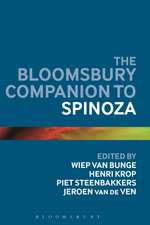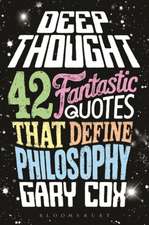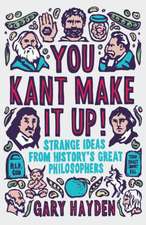The Bloomsbury Companion to Analytic Philosophy: Bloomsbury Companions
Editat de Professor Barry Dainton, Professor Howard Robinsonen Limba Engleză Paperback – 21 oct 2015
| Toate formatele și edițiile | Preț | Express |
|---|---|---|
| Paperback (1) | 271.74 lei 6-8 săpt. | |
| Bloomsbury Publishing – 21 oct 2015 | 271.74 lei 6-8 săpt. | |
| Hardback (1) | 948.45 lei 6-8 săpt. | |
| Bloomsbury Publishing – 20 noi 2013 | 948.45 lei 6-8 săpt. |
Din seria Bloomsbury Companions
- 43%
 Preț: 943.24 lei
Preț: 943.24 lei - 16%
 Preț: 258.54 lei
Preț: 258.54 lei - 21%
 Preț: 256.42 lei
Preț: 256.42 lei - 48%
 Preț: 626.47 lei
Preț: 626.47 lei -
 Preț: 822.27 lei
Preț: 822.27 lei - 17%
 Preț: 256.89 lei
Preț: 256.89 lei - 17%
 Preț: 257.81 lei
Preț: 257.81 lei - 44%
 Preț: 941.35 lei
Preț: 941.35 lei - 41%
 Preț: 226.40 lei
Preț: 226.40 lei -
 Preț: 771.53 lei
Preț: 771.53 lei - 12%
 Preț: 266.68 lei
Preț: 266.68 lei - 44%
 Preț: 940.38 lei
Preț: 940.38 lei - 17%
 Preț: 253.85 lei
Preț: 253.85 lei - 44%
 Preț: 937.45 lei
Preț: 937.45 lei - 45%
 Preț: 141.20 lei
Preț: 141.20 lei - 17%
 Preț: 254.58 lei
Preț: 254.58 lei - 27%
 Preț: 383.62 lei
Preț: 383.62 lei - 44%
 Preț: 938.96 lei
Preț: 938.96 lei - 7%
 Preț: 304.89 lei
Preț: 304.89 lei - 17%
 Preț: 239.59 lei
Preț: 239.59 lei - 12%
 Preț: 257.36 lei
Preț: 257.36 lei - 12%
 Preț: 255.97 lei
Preț: 255.97 lei - 17%
 Preț: 253.67 lei
Preț: 253.67 lei - 12%
 Preț: 264.39 lei
Preț: 264.39 lei - 16%
 Preț: 258.28 lei
Preț: 258.28 lei - 44%
 Preț: 937.06 lei
Preț: 937.06 lei - 41%
 Preț: 225.08 lei
Preț: 225.08 lei - 12%
 Preț: 254.58 lei
Preț: 254.58 lei - 22%
 Preț: 252.76 lei
Preț: 252.76 lei - 17%
 Preț: 255.51 lei
Preț: 255.51 lei - 41%
 Preț: 193.99 lei
Preț: 193.99 lei - 36%
 Preț: 871.22 lei
Preț: 871.22 lei - 44%
 Preț: 938.96 lei
Preț: 938.96 lei - 17%
 Preț: 254.14 lei
Preț: 254.14 lei -
 Preț: 930.14 lei
Preț: 930.14 lei - 11%
 Preț: 267.60 lei
Preț: 267.60 lei - 36%
 Preț: 944.19 lei
Preț: 944.19 lei - 26%
 Preț: 1161.10 lei
Preț: 1161.10 lei - 43%
 Preț: 220.26 lei
Preț: 220.26 lei - 12%
 Preț: 263.56 lei
Preț: 263.56 lei - 43%
 Preț: 925.87 lei
Preț: 925.87 lei -
 Preț: 270.06 lei
Preț: 270.06 lei
Preț: 271.74 lei
Preț vechi: 302.82 lei
-10% Nou
Puncte Express: 408
Preț estimativ în valută:
52.00€ • 56.47$ • 43.68£
52.00€ • 56.47$ • 43.68£
Carte tipărită la comandă
Livrare economică 22 aprilie-06 mai
Preluare comenzi: 021 569.72.76
Specificații
ISBN-13: 9781474236492
ISBN-10: 1474236499
Pagini: 696
Ilustrații: 1 illustration
Dimensiuni: 156 x 234 x 53 mm
Greutate: 1.07 kg
Editura: Bloomsbury Publishing
Colecția Bloomsbury Academic
Seria Bloomsbury Companions
Locul publicării:London, United Kingdom
ISBN-10: 1474236499
Pagini: 696
Ilustrații: 1 illustration
Dimensiuni: 156 x 234 x 53 mm
Greutate: 1.07 kg
Editura: Bloomsbury Publishing
Colecția Bloomsbury Academic
Seria Bloomsbury Companions
Locul publicării:London, United Kingdom
Caracteristici
Provides an accessible historical introduction to the origins of the tradition, covering Russell, Moore, Frege and Wittgenstein as well as influential American philosophers
Notă biografică
Barry Dainton is Professor of Philosophy at the University of Liverpool, UK. His previous publications include Stream of Consciousness (2nd edition, 2006), The Phenomenal Self (2008) and Time and Space (2nd edition, 2010). Howard Robinson is University Professor in the Philosophy Department at Central European University in Budapest, recurrent Visiting Scholar at Fordham University in New York and Senior Fellow of the Center for the Philosophy of Religion at Rutgers University, New Jersey.
Cuprins
Part I: History, Methods and Problems, Barry Dainton1 A Different World2 From Idealism to a Realistic (Platonic) Pluralism3 Principia Ethica4. Principles and Paradox5 Frege6 On Denoting, Acquaintance and Construction7 Wittgenstein and the Tractatus8 The Vienna Circle and its "Wissenschaftliche Weltauffassung"9 Later Wittgenstein10 Quine11 Oxford and Ordinary Language12 Developments in Ethics13 Davidson14 Kripke and Putnam15 Analytic Philosophy of Mind (with Howard Robinson)Appendix: A Simple Introduction to Tarski's Theory of TruthPart II: Current Research and IssuesIntroduction to Part II, Barry Dainton and Howard Robinson16. Mathematics and Logic, Mary Leng17. Philosophy and Language, Barry C Smith18. Meaning, Normativity and Naturalism, Richard Gaskin19. Philosophy of Science, James Ladyman20. Philosophy of Physics, Barry Loewer21. Causation, Helen Beebee22. Metaphysics, E.J Lowe23. Philosophy of Mind: Consciousness, Intentionality and Ignorance, Daniel Stoljar24. Personal Identity: Are we Ontological Trash?, Mark Johnston25. Free Will, Ferenc Huoranszki26. Knowledge, Bryan Frances & Allan Hazlett27. The Philosophy of Perception: An Introduction, Paul Snowdon28. Practical Reasons: The Problem of Gridlock, Ruth Chang29. Political Obligation, and the Site and Scope of Justice, Andres Moles30. Ethics: The Overdemandingness Problem, Attila Tanyi Part III: New Directions in Analytic Philosophy, Barry Dainton and Howard Robinson1. Specialization and Science2. Mind and Consciousness3. Analytic Metaphysics4. Rising Self-Consciousness5. Crisis?30. Coda A: What is Analytic Philosophy?, Barry Dainton and Howard Robinson31. Coda B: Analytic versus Continental, Howard RobinsonNotesPart IV: Research Resources ChronologyTimeline of Individual PhilosophersA-Z of Key Terms and ConceptsResourcesAnnotated BibliographyPart A Analytic Philosophy and its HistoryPart B by Subject and ChapterBibliographyAuthor IndexSubject Index
Recenzii
This reviewer can think of no better book for students about to enter graduate school in analytic philosophy, or indeed for anyone with some knowledge of the field who needs a general guide to fill in the gaps.The volume has obvious competition--free, peer-reviewed resources exist online covering the subtopics of philosophy. Thus it needs to justify its nontrivial price tag, and it does.The pitch of the articles is more historical and the articles themselves are more readable than those in the Stanford Encyclopedia of Philosophy, and more in-depth than those in The Internet Encyclopedia of Philosophy. Summing Up: Highly Recommended.
The organization of the book is excellent ... The contributors cover debates on philosophy of language, science, mathematics, ethics, political obligation, free will, personal identity, practical reason, normativity, mind, perception and metaphysics with clarity and accuracy.
An impressive volume featuring well-chosen contributors and formidable editorial scholarship. Its combination of original topic-based essays and clear historical introductions, together with a glossary, brief chronologies and extensive bibliographies, will make it of great use to undergraduates and researchers alike.
The Bloomsbury Companion to Analytic Philosophy edited by Barry Dainton and Howard Robinson is a valuable contribution to the growing literature on the history, practice, and nature of analytic philosophy. The editors provide an engaging and informative overview of the history and major figures of analytic philosophy as well as insightful discussions of such issues as what is distinctive about analytic philosophy and the differences between analytic and Continental philosophy. This multi-faceted volume also features advanced survey articles by leading philosophers on the major areas of analytic philosophy. The Bloomsbury Companion to Analytic Philosophy is an excellent resource for students and researchers and anyone interested in analytic philosophy, the most important movement in recent and contemporary philosophy. This is a welcome addition to the Bloomsbury Companions series.
The Bloomsbury Companion to Analytic Philosophy manages to combine philosophical investigation and historically informed introduction. If you want a comprehensive guide to analytic philosophy, look no further.
The Bloomsbury Companion to Analytic Philosophy is a very useful addition to the literature on the history and prospects of broadly analytic approaches to philosophical issues. The extensive introduction is especially useful, and offers a lucid and insightful overview of the historical development of analytic philosophy. The chapters provide state of the art overviews of individual topics by acknowledged experts. And the coda seeks to assess the prospects of work in the analytic tradition. The book will be of value for anyone seeking a synoptic view of work within the analytic tradition.
The organization of the book is excellent ... The contributors cover debates on philosophy of language, science, mathematics, ethics, political obligation, free will, personal identity, practical reason, normativity, mind, perception and metaphysics with clarity and accuracy.
An impressive volume featuring well-chosen contributors and formidable editorial scholarship. Its combination of original topic-based essays and clear historical introductions, together with a glossary, brief chronologies and extensive bibliographies, will make it of great use to undergraduates and researchers alike.
The Bloomsbury Companion to Analytic Philosophy edited by Barry Dainton and Howard Robinson is a valuable contribution to the growing literature on the history, practice, and nature of analytic philosophy. The editors provide an engaging and informative overview of the history and major figures of analytic philosophy as well as insightful discussions of such issues as what is distinctive about analytic philosophy and the differences between analytic and Continental philosophy. This multi-faceted volume also features advanced survey articles by leading philosophers on the major areas of analytic philosophy. The Bloomsbury Companion to Analytic Philosophy is an excellent resource for students and researchers and anyone interested in analytic philosophy, the most important movement in recent and contemporary philosophy. This is a welcome addition to the Bloomsbury Companions series.
The Bloomsbury Companion to Analytic Philosophy manages to combine philosophical investigation and historically informed introduction. If you want a comprehensive guide to analytic philosophy, look no further.
The Bloomsbury Companion to Analytic Philosophy is a very useful addition to the literature on the history and prospects of broadly analytic approaches to philosophical issues. The extensive introduction is especially useful, and offers a lucid and insightful overview of the historical development of analytic philosophy. The chapters provide state of the art overviews of individual topics by acknowledged experts. And the coda seeks to assess the prospects of work in the analytic tradition. The book will be of value for anyone seeking a synoptic view of work within the analytic tradition.
